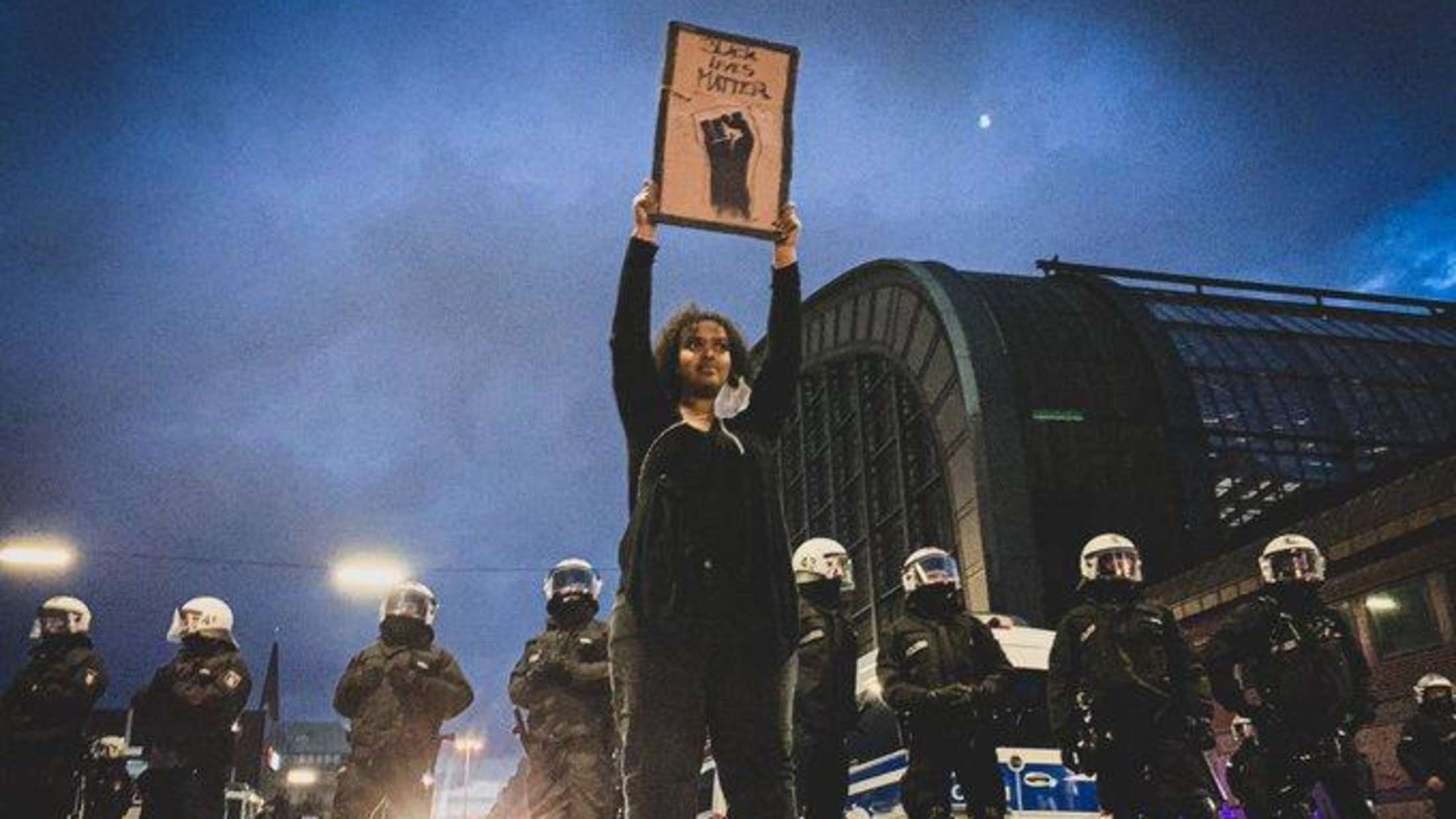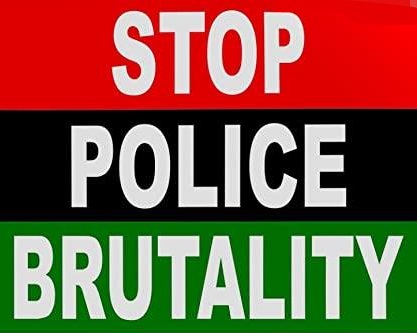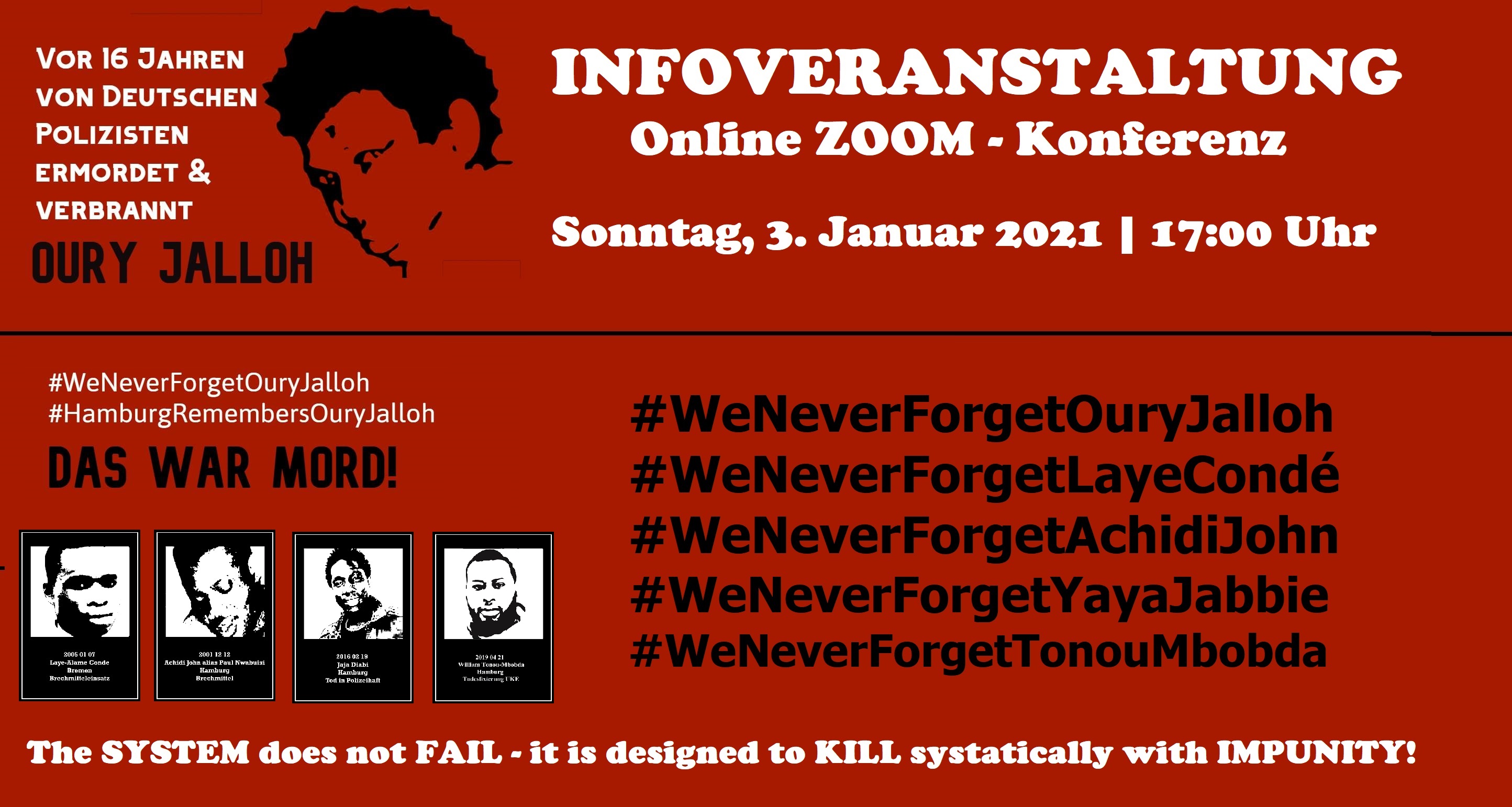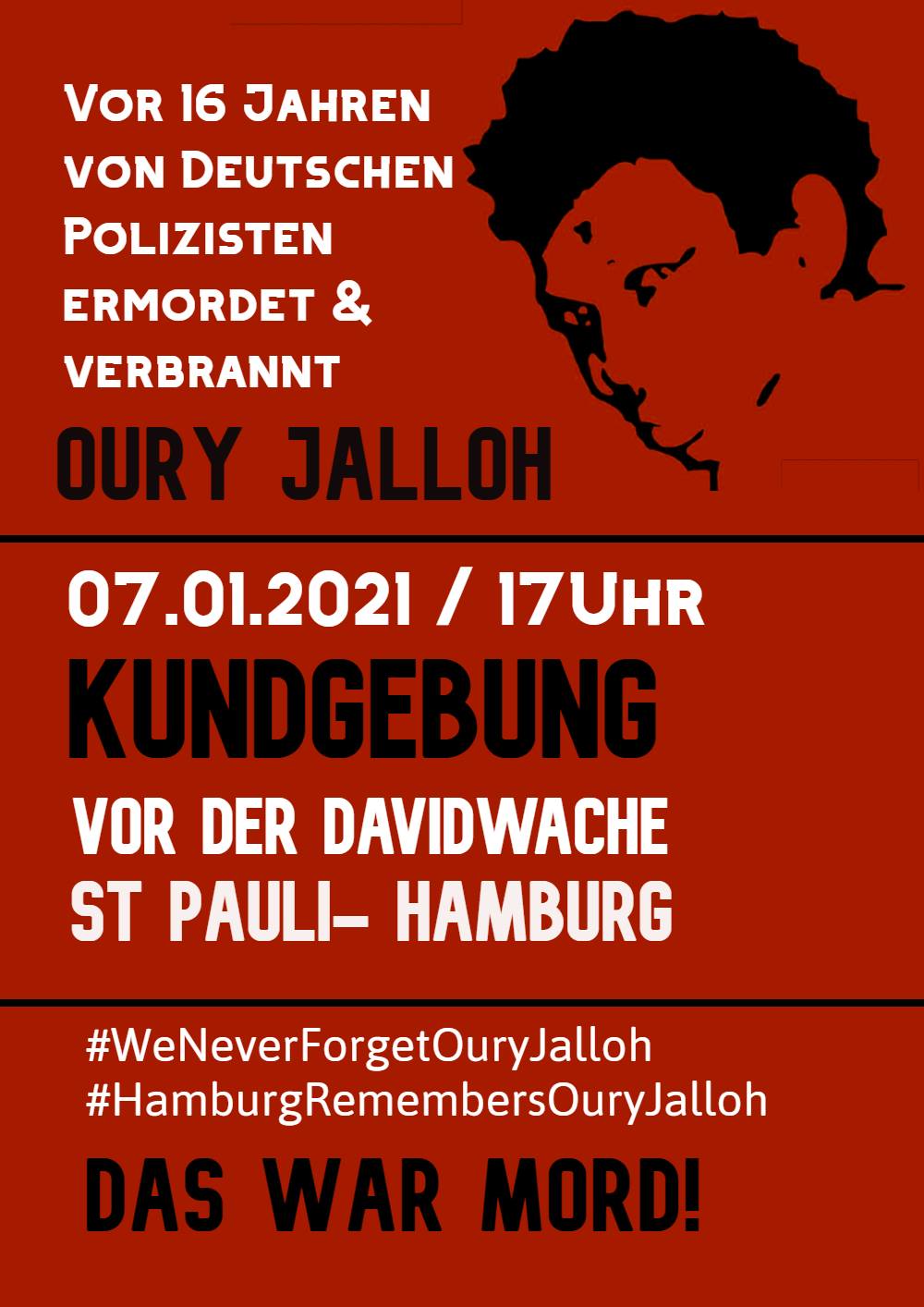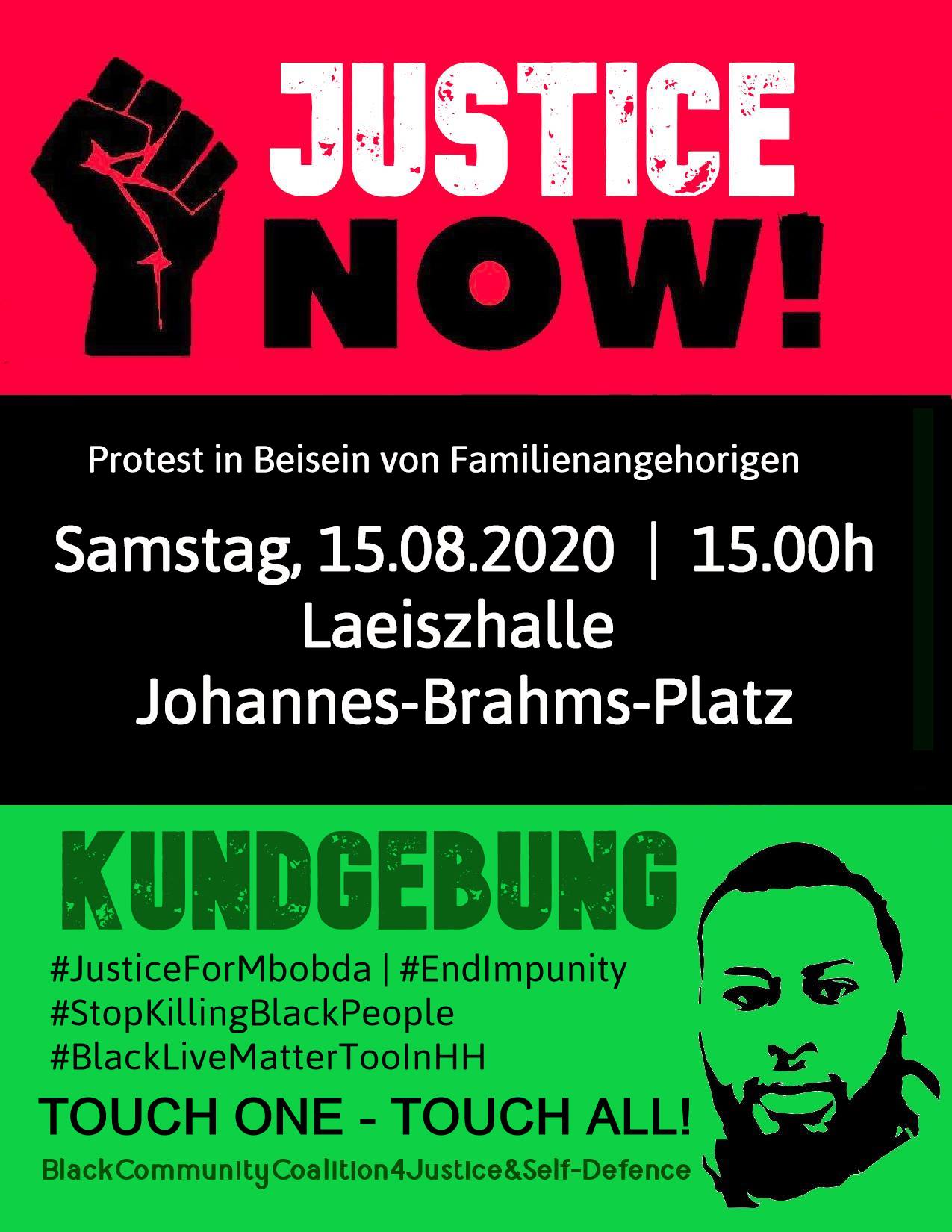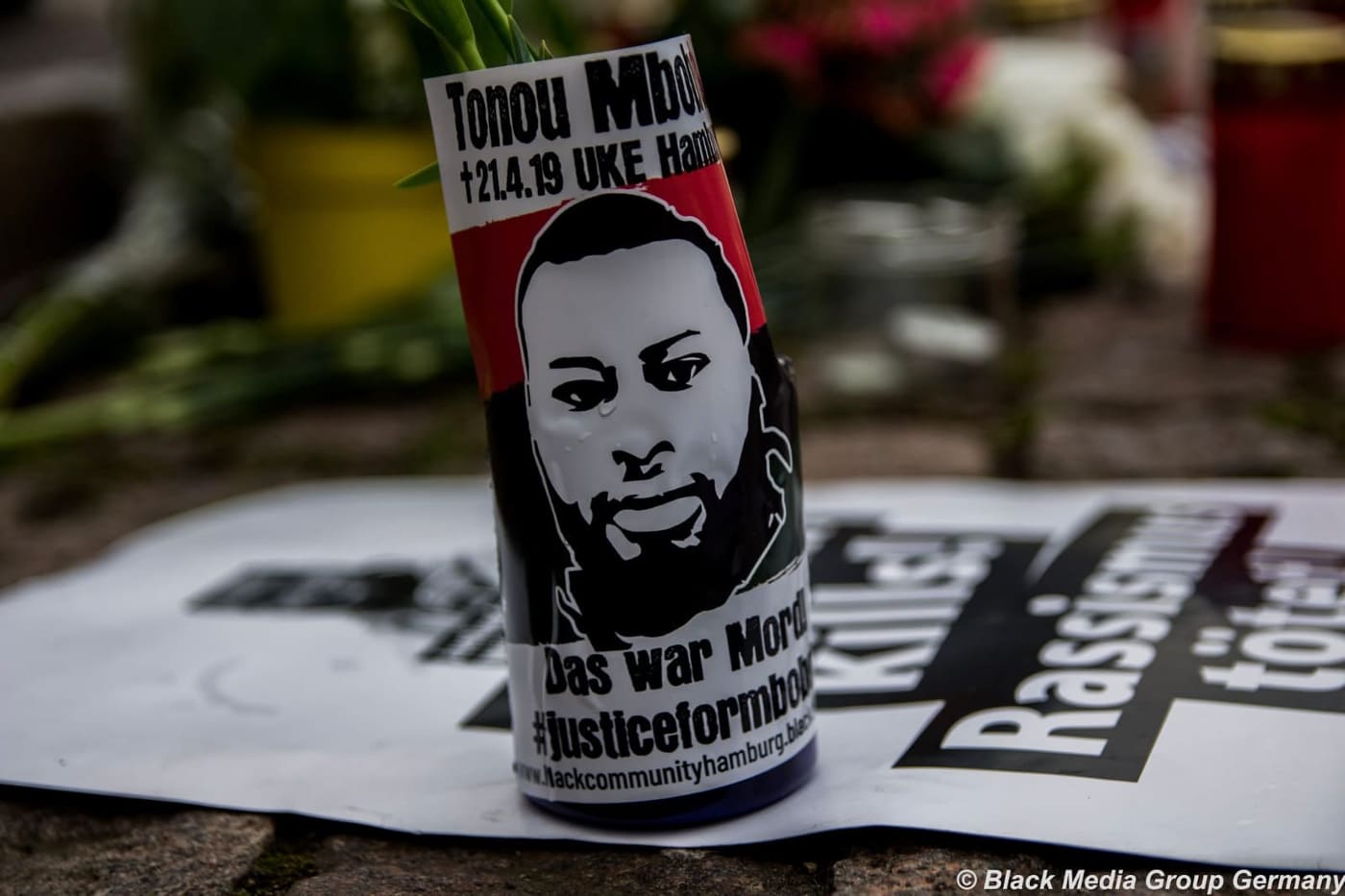Statement zu rassistischen Übergriff der Hamburger Polizei gegen einen Schwarzen Lehrer
Die BLACK COMMUNITY in Hamburg ist empört und verurteilt den rassistischen Übergriff Hamburger Polizeibeamt*innen auf den Schwarzen Lehrer Philip Oprong Spenner von der Stadtteilschule Am Heidberg in Hamburg Langenhorn am 22. November 2020. Einem Zeitungsbericht zufolge „alarmierte“ eine 14-Jährige die Polizei. Sie „meldete“, dass „sich ein schwarzer maskierter Mann“ in der Schule aufhalte.
Die Polizei Hamburg löste daraufhin einen Großeinsatz aus, weil wegen eines einzelnen Schwarzen Mannes mit einem Corona-Mund-Nase-Schutz in einem beleuchteten Klassenzimmer unmittelbar „… der Verdacht bestand, dass sich ein oder mehrere Einbrecher in der Schule befände(n)“. Die Polizei rückte daher mit gleich 5 Peterwagen und 15 Polizist*innen an. Die Polizeibeamt*innen agierten unmittelbar mit gezogenen Dienstwaffen und grellen Taschenlampen, wodurch sich die Nachbarschaft natürlich ebenfalls alarmiert zeigte. Trotz Corona-Pandemie bildete sich im Verlauf eine eigentlich genehmigungspflichtige Zuschauermenge von ca. 100 Menschen.
Bruder Oprong öffnete trotz des aggressiven Auftretens der Beamt*innen das Fenster des Klassenraumes und zeigte keinerlei Fluchtreaktion. Obwohl er erklärte, dass er Lehrer an der Schule sei, die Schlüssel für die Schule besitze und auch die polizeiliche Abfrage der Namen der Schulleitung und des Hausmeisters flüssig beantworten konnte, war der „kriminelle Verdacht“ gegen ihn damit noch lange nicht ausgeräumt. Zwei der Beamten begleiteten ihn ins Lehrerzimmer – was die Ortskenntnis des Lehrers bewies – und nahmen dort die Personalien seiner Ausweispapiere auf, die er dort zurückgelassen hatte. Aber selbst das war freilich noch immer nicht genug – Bruder Oprong sollte trotz Vorliegens seiner Ausweispapiere angeben, wo er denn geboren sei und wie lange er sich schon in Deutschland aufhalte. Beendet wurde der Polizeieinsatz in der Stadtteilschule erst nach 38 min und mehreren Telefonaten zur Bestätigung seiner Identität und den mitgeteilten Angaben zum Lebenslauf.
Diese Handlungsweise der Hamburger Polizei gegenüber einem Schwarzen Lehrer demonstriert einmal mehr den tief verankerten und institutionellen Kriminalisierungswillen dieser Behörde gegenüber Schwarzen Menschen. Nicht nur, dass die Polizei ohne konkrete tatsächliche Hinweise gleich „mehrere Einbrecher“ zurechtfantasiert und einen Großeinsatz auslöst – die Beamt*innen vor Ort ignorierten sowohl die Kooperationsbereitschaft und Orts- und Personalkenntnis des von ihnen zwanghaft Verdächtigten als auch seine Schlüsselgewalt über das Schulgebäude. Darüber hinaus bezweifelten sie ganz offensichtlich auch noch die Echtheit seiner Ausweispapiere, weswegen sie ihn trotz des Vorliegens immer weiter zu persönlichen Angaben wie zum Geburtsort oder dem Beginn seines Aufenthaltes in Deutschland befragten.
Wie kann das denn sein?
Widerspricht ein Schwarzer Lehrer dem „kriminalistischen Erfahrungsschatz“ dieser Polizist*innen etwa so vehement, dass seine offensichtlich zutreffenden Angaben konsequent unglaubwürdig erscheinen müssen? Ist es tatsächlich professioneller Standard der Polizei Hamburg, sich nach einer Waffenandrohung gegen einen zu Unrecht Verdächtigten und einer extensiven 38-minütigen Verhör- und Kontrollmaßnahme mit Bestätigung der Richtigkeit aller Angaben nicht wenigstens für die verursachten „Unannehmlichkeiten“ zu entschuldigen? Oder kann eine solch angemessene wie erwartbare Entschuldigung bei Schwarzen Menschen etwa generell einfach so unterbleiben?
Die unwürdige und diskriminierende Behandlung von Bruder Oprong ist ohne rassistische Stereotype und dem kollektiven Willen zu willkürlich erniedrigender und unangemessen gewaltvoller Behandlung von Schwarzen Menschen ganz generell nicht erklärbar. Genau so zeigt sich institutionalisierter Rassismus und genau so entäußern sich die unsäglichen kollektiven Vorurteile durch strukturell gewolltes und politisch geduldetes Racial Profiling durch Strafverfolgungsbehörden.
Einerseits sind wir schockiert über einen erneuten kollektiv-rassistischen Übergriff der Hamburger Polizei aber andererseits auch erleichtert darüber, dass dieser gewalttätige Angriff auf Bruder Oprong nicht noch weiter eskaliert ist oder mit körperlichen Verletzungen oder nach der angedrohten Waffengewalt gar tödlich geendet hat. Die Menschen unserer Communities fühlen sich von diesem Vorgang re-traumatisiert, verunsichert und erneut kollektiv gedemütigt. Dazu trägt auch bei, dass sich weder die Leitung, noch das Lehrer*innenkollektiv der Stadtteilschule bisher öffentlich mit ihrem Kollegen solidarisiert oder den Vorfall selbst skandalisiert haben.
Wir verurteilen das wiederholte rassistische Agieren der Hamburger Polizei auf das Schärfste und erwarten eine angemessene Entschuldigung der verantwortlichen Polizeibeamt*innen sowie eine öffentliche Stellungnahme der Polizeiführung. Von den politisch Verantwortlichen der Innenbehörde und dem Senat erwarten wir nun endlich Konsequenzen und Entscheidungen zur nachhaltigen Umsetzung von Maßnahmen zur Unterbindung strukturell diskriminierender Polizeipraktiken, eine adäquate anti-rassistische Aus- und Weiterbildung für alle Beamt*innen und die transparente Offenlegung von Effizienz und Verhältnismäßigkeit polizeilicher Maßnahmen. Fehlerkultur und Veränderung benötigen statistische Grundlagen und transparente Analysen statt Ignoranz und Korpsgeist.
Black Community Coalition for Justice & Self-Defense
Kontakt: mailto:info@blackcommunitycoalition.de
Mitunterzeichner*innen:
BLACK COMMUNITY in Hamburg | BLACK COMMUNITY in Deutschland | ARRiVATi | CECAM e.V. | Alafia – Afrika Festival | ARCA – Afrikanisches Bildungszentrum e.V. | Akonda | African Communities Organisers |AICC – Afro-International Culture Center |Black Lives Matter Hamburg | Black Media Group Germany | Tschobe für Freedom | Initiative in Remembrance of YAYA JABBI | ASUIHA – African Survival in Hamburg | Sierra Leone Community| Naija EndSars Protest Group | Egbe Isedale Ati ilosiwaju omo Yoruba Ev.|Guinea Community initiative| African Home | Asmaras Refugee Support| Black Students for Justice | TopAfric Radio | African Heritage | Refugee Radio Network | FemcamH e.V. | Lessan e.V. | Sipua Consulting | ISD Hamburg |Initiative in Gedenken an Oury Jalloh | The VOICE Refugee Forum Germany | Karawane für die Rechte von Geflüchteten und Migrant*innen | Sonja Collison
PDF_Statement-Rassistischer-Polizeiübergriff-auf-Bruder-Oprong
EN
Hamburg, January 27, 2021
Statement on a racist assault by Hamburg police against a Black teacher
The BLACK COMMUNITY in Hamburg is outraged and condemns the racist attack of Hamburg police officers* on the Black teacher Philip Oprong Spenner from the district school Am Heidberg in Hamburg Langenhorn on November 22, 2020. According to a newspaper report, a 14-year-old girl „alerted“ the police. She „reported“ that „a black masked man“ was in the school.
The Hamburg police immediately launched a large-scale operation because, as a result of a black man wearing a Corona mouth-nose protection in a lit classroom“… The suspicion was that one or more burglars were in the school.“ The police arrived with a squad of no less than 5 police cars and 15 police officers. The officers took immediate action with drawn service weapons and bright flashlights, which of course alarmed the neighborhood. Despite the Corona pandemic, a crowd of about 100 people formed in the course of the event, an assembly which would normally have required an official permit.
Brother Oprong opened the window of the classroom despite the aggressive behavior of the officers and showed no intention to escape and although he explained that he was a teacher at the school, that he had the keys to the school, and even the fact that he answered the police query about the names of the school administration and the janitor with no hesitation, the „criminal suspicion“ against him was still far from being dispelled. Two of the officers accompanied him to the teachers‘ room – which proved the teacher’s knowledge of the building – and took down the personal data of his identity papers. Even that was not enough – Brother Oprong was interrogated and had to state where he was born and how long he had been residing in Germany. Despite the fact that he presented his identity papers, it still took several telephone calls to confirm his identity. He had to endure the entire police operation for over 38 minutes.
This behavior of the Hamburg police towards a Black teacher demonstrates once again the deeply rooted and institutional will of this authority to criminalize Black people. Not only did the police imagine „several burglars“ without concrete actual evidence and launched a large-scale operation – the officers on site both ignored both his willingness to cooperate as well as his local and grounded knowledge of the school building, the staff rooms. They officers compulsively held him suspect despite the fact that he was authorized to be in possession of the school In addition, obviously they doubted the authenticity of his identity papers, which is why they continued to question him about personal details such as his place of birth or the beginning of his stay in Germany, despite the fact that written information was available to them.
How can this be?
Does a Black teacher contradict the „criminalistics experience“ of these police officers so vehemently that his obviously correct statements must appear consistently implausible to them? Is it really professional standard of the Hamburg police to not at least apologize for the „inconvenience“ caused after a threat with a weapon against a wrongly suspected person and an extensive 38-minute interrogation and control measure with confirmation of the correctness of all statements? Or can such an appropriate and expected apology simply be omitted from Black people in general?
The undignified and discriminatory treatment of Brother Oprong cannot be explained without racist stereotypes and the collective will to arbitrarily humiliate and unreasonably treat Black people violently in general. This is exactly how institutionalized racism manifests itself and exactly how the unspeakable collective prejudices are expressed through structurally founded and politically condoned racial profiling by law enforcement agencies.
On the one hand, we are shocked by yet another collective racist attack by the Hamburg police, but on the other hand, we are also somehow relieved that this violent attack on Brother Oprong did not escalate even further or ended up with physical injuries or fatal after the threatened on gun point. The people of our communities feel re-traumatized, unsettled and once again collectively humiliated by this event. It also contributes to this that neither the management, nor the teachers‘ collective of the district school have so far publicly shown solidarity with their colleague or scandalized the incident itself.
We strongly condemn the repeated racist actions of the Hamburg police and expect an appropriate apology from the responsible police officers as well as a public statement of the head of police. From the political leaders of the Interior Department and the Senate, finally, we expect consequences and decisions for sustainable implementation of measures to stop structurally discriminatory police practices, for appropriate anti-racist education and training for all officers and for transparent disclosure of efficiency and proportionality of police measures in general. A reflective culture on errors and a climate of change require a statistical basis and transparent analysis instead of ignorance and a code of silence.
Black Community Coalition for Justice & Self-Defense
Contact: mailto:info@blackcommunitycoalition.de
Co-signers:
BLACK COMMUNITY in Hamburg | BLACK COMMUNITY in Deutschland | ARRiVATi | CECAM e.V. | Alafia – Afrika Festival | ARCA – Afrikanisches Bildungszentrum e.V. | Akonda | African Communities Organisers |AICC – Afro-International Culture Center |Black Lives Matter Hamburg | Black Media Group Germany | Tschobe für Freedom | Initiative in Remembrance of YAYA JABBI | ASUIHA – African Survival in Hamburg | Sierra Leone Community| Naija EndSars Protest Group | Egbe Isedale Ati ilosiwaju omo Yoruba Ev.|Guinea Community initiative| African Home | Asmaras Refugee Support| Black Students for Justice | TopAfric Radio | African Heritage | Refugee Radio Network | FemcamH e.V. | Lessan e.V. | Sipua Consulting | ISD Hamburg |Initiative in Gedenken an Oury Jalloh | The VOICE Refugee Forum Germany | Karawane für die Rechte von Geflüchteten und Migrant*innen | Sonja Collison
